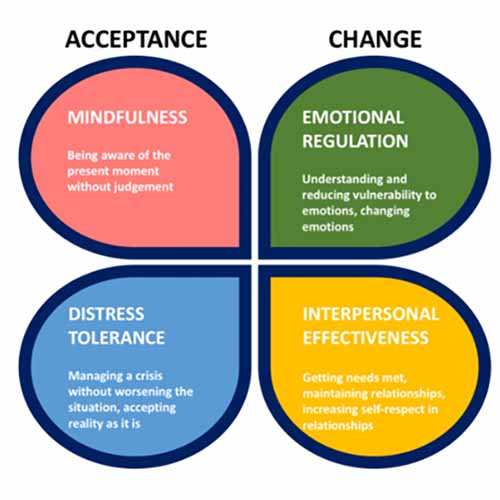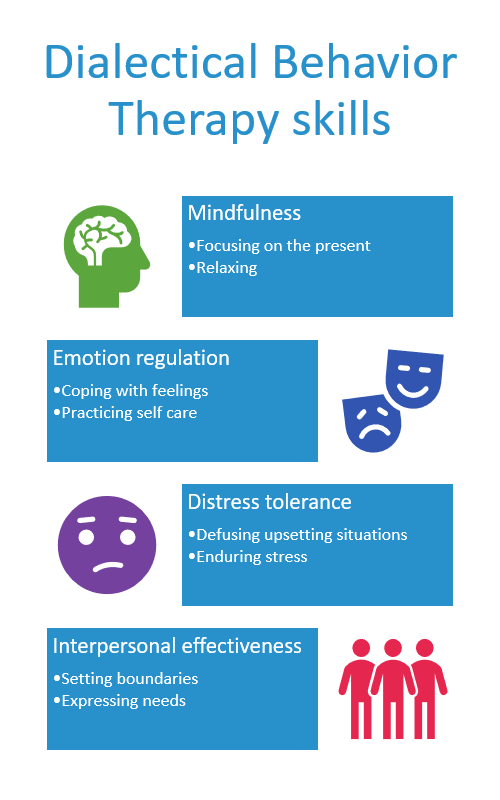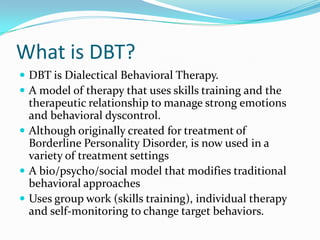DBT London: Where Hope and Recovery Intersect for Lasting Adjustment
DBT London: Where Hope and Recovery Intersect for Lasting Adjustment
Blog Article
Utilizing the Power of Dialectical Behavior Treatment (DBT) Solutions for Sustainable Emotional Balance and Improved Relationships
In a world where psychological well-being and keeping healthy and balanced relationships are essential elements of a meeting life, the utilization of Dialectical Behaviour Treatment (DBT) services has emerged as a beacon of hope for lots of individuals. The evidence-based and structured strategy of DBT provides a pathway towards sustainable psychological equilibrium and boosted communications with others. By developing in on core principles, individuals can establish necessary abilities for controling emotions, boosting social effectiveness, and fostering mindfulness. However, the true power of DBT lies not simply in comprehending these concepts but in the functional application of techniques in life. As we navigate the intricacies of human emotions and relationships, harnessing the potential of DBT solutions ends up being a transformative trip worth discovering even more.

Understanding the Core Concepts of DBT
Dialectical Behavior Treatment (DBT) is established upon a collection of core principles that underpin its healing technique to promoting emotional balance and mental well-being. Mindfulness is another core principle of DBT, concentrating on being totally present in the minute without judgment.

Validation is additionally integral to DBT, highlighting the value of acknowledging and accepting one's experiences and feelings as legitimate. Through recognition, people can learn to browse their feelings with empathy and understanding, promoting self-acceptance and psychological growth. Finally, behaviorism plays an important role in DBT, stressing the adjustment of maladaptive behaviors via support and skill-building. By incorporating these core principles right into therapy, DBT provides a effective and thorough approach to advertising emotional health and mental strength.
Creating Emotional Law Skills
Psychological guideline skills are necessary components of Dialectical Actions Therapy (DBT) that enable people to properly manage their emotions and navigate difficult circumstances with strength. These skills incorporate the ability to identify and understand one's emotions, endure distress, manage intense feelings, and act according to individual worths also when faced with psychological turmoil. Creating emotional guideline skills includes discovering mindfulness techniques to stay present in the moment, recognizing the triggers that cause psychological dysregulation, and applying coping techniques to modulate psychological reactions.

Enhancing Interpersonal Effectiveness
Improving interaction abilities and promoting purposeful links with others are essential aspects of developing interpersonal efficiency within the structure of Dialectical Actions Therapy (DBT) In DBT, improving social effectiveness entails learning just how to assertively express one's demands and borders while also taking into consideration the requirements and limits of others. This ability is essential for developing healthy partnerships and decreasing conflict. DBT shows people how to interact effectively, browse social obstacles, and develop techniques for settling conflicts in a positive manner.
One key component of enhancing interpersonal efficiency in DBT is finding out to acknowledge and take care of emotions in social interactions. DBT London. By enhancing psychological understanding, people can reply to others in a more compassionate and understanding way. top article Furthermore, DBT highlights the value of practicing mindfulness in interpersonal connections, urging people to be present in their communications and totally involve with others
Exercising Mindfulness Techniques
Creating a regular mindfulness technique is crucial for individuals undertaking Dialectical Behavior modification (DBT) to cultivate emotional law and improve their interpersonal effectiveness. Mindfulness strategies, a core part of DBT, include paying focus to the present moment without judgment. Through mindfulness, people can come to be more conscious of their ideas, feelings, and physical sensations, allowing them to react to situations with better clearness and control.
One secret mindfulness strategy utilized in DBT is mindfulness reflection. This method entails concentrating on the breath or a particular object while acknowledging and allowing go of any type of disruptive thoughts. By including mindfulness reflection into their daily regimen, individuals can educate their minds to stay existing and reduce reactivity to stress factors.
Another crucial facet of exercising mindfulness in DBT is the idea of extreme acceptance. Radical acceptance involves totally embracing truth as it is, also when it is challenging click site or uncomfortable. By accepting the here and now moment without judgment, individuals can minimize their suffering and make space for favorable modification.
Applying DBT Techniques in Daily Life
Structure upon the structure of mindfulness techniques such as meditation and radical approval, individuals my latest blog post can incorporate DBT approaches into their everyday lives to cultivate psychological equilibrium and boost their social abilities. Additionally, interpersonal performance skills taught in DBT can aid people connect their needs assertively, set boundaries, and maintain healthy connections. By regularly applying these DBT techniques in day-to-day life, individuals can experience lasting emotional balance and enhance their overall health.
Final Thought

Psychological law skills are important components of Dialectical Actions Treatment (DBT) that allow individuals to properly handle their emotions and navigate tough scenarios with resilience.Through DBT services, people can grow a much deeper awareness of their feelings, recognize patterns of actions that contribute to psychological distress, and get useful devices to regulate their sensations constructively.Developing a regular mindfulness method is important for people going through Dialectical Habits Treatment (DBT) to cultivate emotional regulation and improve their social performance.Structure upon the structure of mindfulness techniques such as reflection and radical acceptance, people can integrate DBT approaches into their everyday lives to cultivate psychological balance and improve their social abilities. By comprehending the core concepts of DBT, establishing emotional regulation abilities, boosting social efficiency, practicing mindfulness strategies, and applying DBT approaches in daily life, individuals can experience considerable improvements in their overall well-being and connections.
Report this page